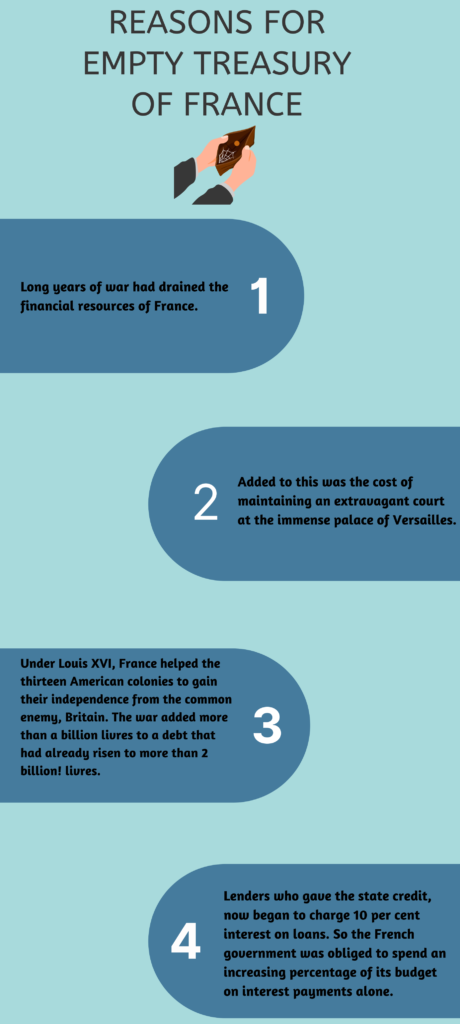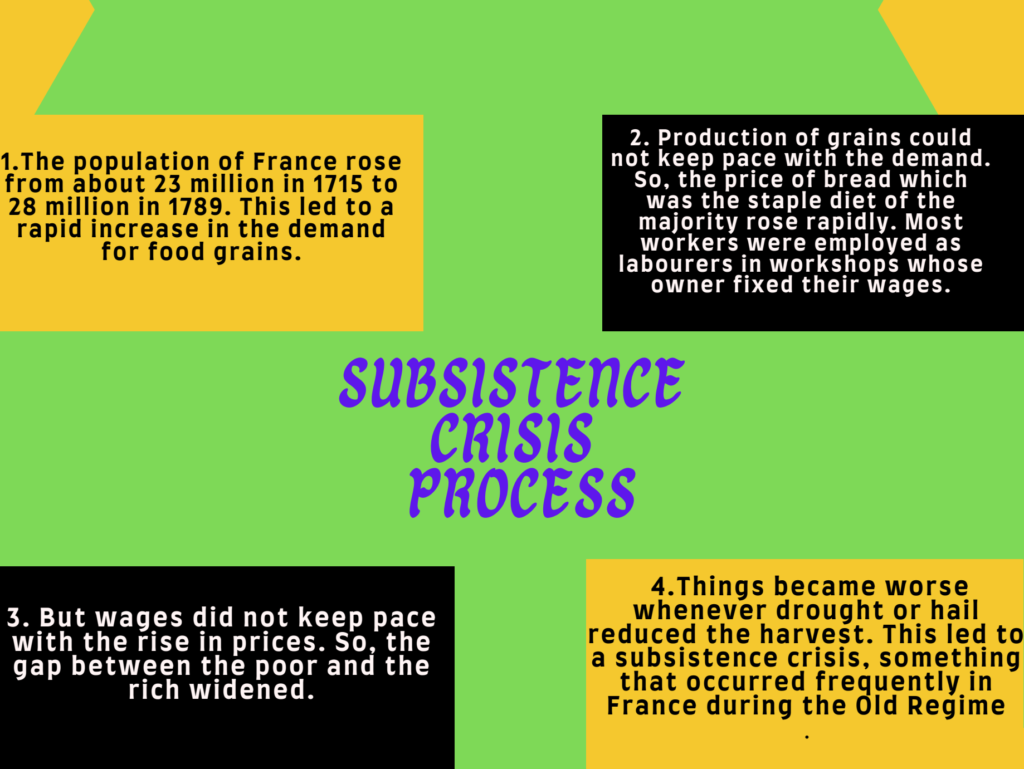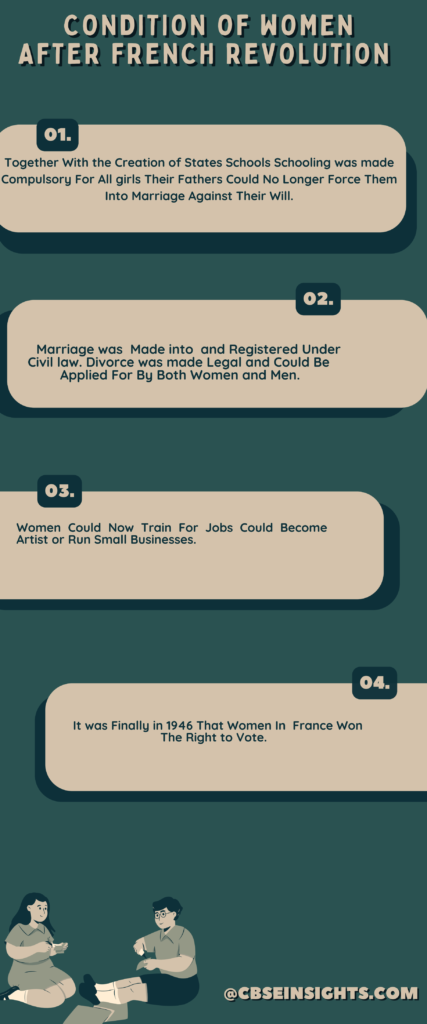FRENCH SOCIETY DURING THE LATE EIGHTEEN CENTURY
In 1774, Louis XVI of the Bourbon family of kings ascended the throne of France. When he became the ruler of France. He found his treasury empty.

To meet its regular expenses, such as the cost of maintaining an army, the court, and running government offices or universities, the state was forced to increase taxes
The term Old Regime is usually used to describe the society and institutions of France before 1789.

The Church too extracted its share of taxes called tithes from the peasants, and finally, all members of the third estate had to pay taxes to the state.
These included a direct tax, called taille,

In the past, peasants and workers had participated in revolts against increasing taxes and food scarcity. But they lacked the means and programs to carry out full-scale measures that would bring about a change in the social and economic order.
- EMERGENCE OF MIDDLE CLASS
- The eighteenth century witnessed the emergence of social groups, termed the middle class, who earned their wealth through expanding overseas trade and from the manufacture of goods such as woolen and silk textiles that were either exported or bought by the richer members of society.
- In addition to merchants and manufacturers, the third estate included professions such as lawyers or administrative officials. All of these were educated and believed that no group in society should be privileged by birth
IDEAS OF PHILOSOPHERS
These ideas envisaging a society based on freedom and equal laws and opportunities for all, were put forward by philosophers such as John Locke and Jean Jacques Rousseau.
John Locke
- In his Two Treatises of Government, Locke sought to refute the doctrine of the divine and absolute right of the monarch.
Jean Jacques Rousseau
- Rousseau carried the idea forward, proposing a form of government based on a social contract between people and their representatives.
Montesquieu
- In the Spirit of the Laws, Montesquieu proposed a division of power within the government between the legislative, the executive and the judiciary. This model of government was put into force in the USA, after the thirteen colonies declared their independence from Britain
- THE OUT BREAK OF REVOLUTION
- In France of the Old Regime the monarch did not have the power to impose taxes according to his will alone. Rather he had to call a meeting of the Estates General which would then pass his proposals for new taxes
Estates General
The Estates General was a political body to which the three estates sent their representatives
On 5 May 1789, Louis XVI called together an assembly of the Estates General to pass proposals for new taxes. A resplendent hall in Versailles was prepared to host the delegates.
The first and second estates sent 300 representatives each, who were seated in rows facing each other on two sides, while the 600 members of the third estate had to stand at the back. The third estate was represented by its more prosperous and educated members. Peasants, artisans, and women were denied entry to the assembly. However, their grievances and demands were listed in some 40,000 letters that the representatives had brought with them.
Voting in the Estates General in the past had been conducted according to the principle that each estate had one vote. This time too Louis XVI was determined to continue the same practice. But members of the third estate demanded that voting now be conducted by the assembly as a whole, where each member would have one vote
TENNIS COURT OATH
The representatives of the third estate viewed themselves as spokesmen for the whole French nation. On 20 June they assembled in the hall of an indoor tennis court in the grounds of Versailles. They declared themselves a National Assembly and swore not to disperse till they had drafted a constitution for France that would limit the powers of the monarch. They were led by Mirabeau and Abbe Sieyes
- While the National Assembly was busy at Versailles drafting a constitution, the rest of France seethed with turmoil.
- A severe winter had meant a bad harvest; the price of bread rose, often bakers exploited the situation and hoarded supplies.
- After spending hours in long queues at the bakery, crowds of angry women stormed into the shops. At the same time, the king ordered troops to move into Paris. On 14 July, the agitated crowd stormed and destroyed the Bastille.
- Faced with the power of his revolting subjects, Louis XVI finally accorded recognition to the National Assembly and accepted the principle that his powers would from now on be checked by a constitution.
- On the night of 4 August 1789, the Assembly passed a decree abolishing the feudal system of obligations and taxes. Members of the clergy too were forced to give up their privileges. Tithes were abolished and lands owned by the Church were confiscated
FRANCE BECOMES A CONSTITUTIONAL MONARCHY
- The National Assembly completed the draft of the constitution in 1791. Its main object was to limit the powers of the monarch
- The Constitution of 1791 vested the power to make laws in the National Assembly, which was indirectly elected. That is, citizens voted for a group of electors, who in turn chose the Assembly. Not all citizens, however, had the right to vote.
- ACTIVE CITIZEN
- Only men above 25 years of age who paid taxes equal to at least 3 days of a laborer’s wage were given the status of active citizens, that is, they were entitled to vote.
- PASSIVE CITIZEN
- The remaining men and all women were classed as passive citizens.
To qualify as an elector and then as a member of the Assembly, a man had to belong to the highest bracket of taxpayer
The Constitution began with a Declaration of the Rights of Man and Citizen. Rights such as the right to life, freedom of speech, freedom of opinion, and equality before the law, were established as ‘natural and inalienable rights, that is, they belonged to each human being by birth and could not be taken away
- FRANCE AS REPUBLIC
The situation in France continued to be tense during the following years. Although Louis XVI had signed the Constitution, he entered into secret negotiations with the King of Prussia. Rulers of other neighboring countries too were worried by the developments in France and made plans to send troops to put down the events that had been taking place there since the summer of 1789.
- Thousands of volunteers thronged from the provinces to join the army. They saw this as a war of the people against kings and aristocracies all over Europe.
- Among the patriotic songs they sang was the Marsei!!aise, composed by the poet Roget de L’Isle. It was sung for the first time by volunteers from Marsei!! es as they marched into Paris and so got its name. The Marseillaise is now the national anthem of France.
- POLITICAL CLUBS
- Political clubs became an important rallying point for people who wished to discuss government policies and plan their own forms of action. The most successful of these clubs was that of the Jacobins, which got its name from the former convent of St Jacob in Paris.
- The members of the Jacobin club belonged mainly to the less prosperous sections of society. They included small shopkeepers, artisans such as shoemakers, pastry cooks, watch-makers, printers, as well as servants and daily-wage workers.
- Their leader was Maximilian Robespierre.
These Jacobins came to be known as the sans-culottes, literally meaning ‘those without knee breeches. Sans-culottes men wore, in addition, the red cap that symbolized liberty. Women however were not allowed to do so.
In the summer of 1792, the Jacobins planned an insurrection of a large number of Parisians who were angered by the short supplies and high prices of food. On the morning of August 10, they stormed the Palace of the Tuileries, massacred the king’s guards and held the king himself as hostage for several hours. Later the Assembly voted to imprison the royal family. Elections were held. From now on all men of 21 years and above, regardless of wealth, got the right to vote
- CONVENTION
The newly elected assembly was called the Convention. On 21 September 1792, it abolished the monarchy and declared France a republic.
- PERIOD OF TERROR
- The period from 1793 to 1794 is referred to as the Reign of Terror. Robespierre followed a policy of severe control and punishment.
- All those whom he saw as being ‘enemies’ of the republic – ex-nobles and clergy, members of other political parties, even members of his own party who did not agree with his methods – were arrested, imprisoned, and then tried by a revolutionary tribunal.
- If the court found them ‘guilty’ they were guillotined.

Women were disappointed that the Constitution of 1791 reduced them to passive citizens. They demanded the right to vote, to be elected to the Assembly and to hold political office.

- ABOLITION OF SLAVERY
One of the most revolutionary social reforms of the Jacobin regime was the abolition of slavery in the French colonies. The colonies in the Caribbean – Martinique, Guadeloupe, and San Domingo – were important suppliers of commodities such as tobacco, indigo, sugar, and coffee. But the reluctance of Europeans to go and work in distant and unfamiliar lands meant a shortage of labor on the plantations. So, this was met by a triangular slave trade between Europe, Africa, and the Americas.
- The slave trade began in the seventeenth century. French merchants sailed from the ports of Bordeaux or Nantes to the African coast, where they bought slaves from local chieftains. Branded and shackled, the slaves were packed tightly into ships for the three-month-long voyage across the Atlantic to the Caribbean.
- There they were sold to plantation owners. The exploitation of slave labor made it possible to meet the growing demand in European markets for sugar, coffee, and indigo.
- Port cities like Bordeaux and Nantes owed their economic prosperity to the flourishing slave trade
- It was finally the Convention which in 1794 legislated to free all slaves in the French overseas possessions. This, however, turned out to be a short-term measure: ten years later, Napoleon reintroduced slavery.
Plantation owners understood their freedom as including the right to enslave African Negroes in pursuit of their economic interests. Slavery was finally abolished in French colonies in 1848
- ABOLITION OF CENSORSHIP
- In the Old Regime all written material and cultural activities – books, newspapers, plays – could be published or performed only after they had been approved by the censors of the king. Now the Declaration of the Rights of Man and Citizen proclaimed freedom of speech and expression to be a natural right.
- Newspapers, pamphlets, books, and printed pictures flooded the towns of France from where they traveled rapidly into the countryside. They all described and discussed the events and changes taking place in France.
- Freedom of the press also meant that opposing views of events could be expressed. Each side sought to convince the others of its position through the medium of print. Plays, songs, and festive processions attracted large numbers of people
In 1804, Napoleon Bonaparte crowned himself Emperor of France. He set out to conquer neighboring European countries, dispossessing dynasties and creating kingdoms where he placed members of his family. Napoleon saw his role as a modernizer of Europe.
- REFORMS BY NAPOLEON
- He introduced many laws such as the protection of private property and a uniform system of weights and measures provided by the decimal system.
- Initially, many saw Napoleon as a liberator who would bring freedom for the people. But soon the Napoleonic armies came to be viewed everywhere as an invading force. He was finally defeated at Waterloo in 1815.
- Many of his measures that carried the revolutionary ideas of liberty and modern laws to other parts of Europe had an impact on people long after Napoleon had left.
- LEGACY OF THE FRENCH REVOLUTION
- The ideas of liberty and democratic rights were the most important legacy of the French Revolution. These spread from France to the rest of Europe during the nineteenth century, where feudal systems were abolished.
- Colonized peoples reworked the idea of freedom from bondage into their movements to create a sovereign nation-state. Tipu Sultan and Rammohan Roy are two examples of individuals who responded to the ideas coming from revolutionary France